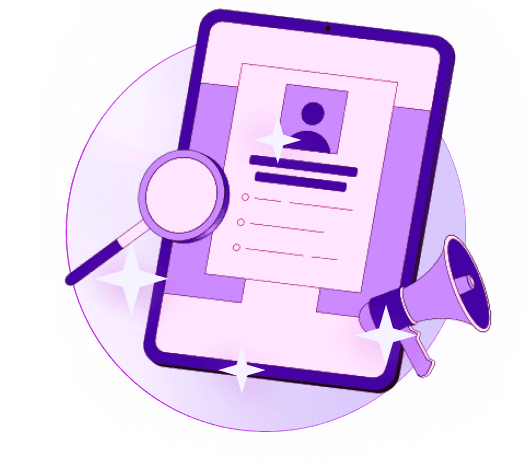Blogs
Articles


AI Lead Qualification: How to Automate and Optimize Your Sales Process
Marketing campaigns generate plenty of leads, but here's a shocking fact: nearly 70% never convert into actual sales.
This is quite eye-opening. The numbers get even more interesting - waiting more than five minutes to respond means you're 10 times less likely to qualify a lead successfully.
In this piece, we'll look at automated lead qualification mechanics, the techniques that make AI lead qualification powerful, and ways to enhance your B2B lead qualification process. Let's head over to how AI helps you focus on what matters most - closing deals with qualified prospects.
What is ai lead qualification?
AI lead qualification has transformed how businesses spot and rank potential customers. Companies no longer rely on instinct or manual scoring. Instead, smart algorithms analyze massive data sets to find the most promising prospects.
The heart of AI lead qualification lies in its automated approach. Machine learning and predictive analytics work together to assess leads on multiple factors at once. These systems get smarter with each interaction and become better at spotting golden opportunities as they process more data.
AI tools excel at spotting patterns that humans often overlook. These systems can predict buying intent with amazing accuracy by connecting dots between seemingly random behaviors. To name just one example, see how AI can tell when prospects who download specific resource combinations and visit certain product pages in order are more likely to become customers.
The core technology includes:
Natural language processing to analyze communication content
Machine learning algorithms that improve through experience
Predictive modeling to forecast future behavior
Behavioral analytics to interpret prospect actions
Integration capabilities with existing CRM systems
Understanding the Lead Qualification Process
Lead qualification is the backbone of a successful sales process. Sales teams evaluate prospects to see if they could become paying customers by looking at their needs, budget, authority, and timeline. Sales teams waste about 67% of their time on unqualified leads when they don't qualify properly.
What is lead qualification and why it matters?
Lead qualification makes sure sales reps spend time on the right prospects who could become long-term customers. This method helps businesses focus on high-potential prospects that lead to better conversion rates and sales results. It also helps companies use their resources wisely by targeting leads that are most likely to bring in revenue.
The results are impressive. Well-qualified leads boost conversion rates and speed up the sales cycle. This helps businesses grow steadily and stay profitable in competitive markets.
The difference between MQLs and SQLs
Marketing Qualified Leads (MQLs) are prospects that marketing teams consider ready to receive emails, content, and social media updates. These leads show interest but might not be ready to buy right away.
Sales Qualified Leads (SQLs) are different. They're ready to talk to sales reps and enter the sales pipeline. The main difference is their intention to buy—SQLs want to make a purchase while MQLs are still checking out their options.
Gartner's research shows that only 21% of MQLs turn into SQLs. This highlights why proper qualification is crucial.
Common challenges in manual qualification
Manual lead qualification comes with several roadblocks that hurt sales success:
The process takes too long and slows down sales
Human factors like tiredness lead to inconsistent evaluations
Finding quality leads among many prospects is tough
Decisions rely on old or incomplete data instead of current information
Growing businesses need more agents, which increases costs
Sales and marketing teams often disagree about qualification standards. This creates confusion and wastes opportunities.
How AI Transforms Lead Qualification
Sales teams waste too much time on tasks that don't involve selling. Research shows they spend only 25% of their time selling to customers. They use the rest for administrative work, research, and manual qualification - this creates a major bottleneck in the sales process.
AI vs traditional lead qualification methods
AI lead qualification is different from conventional methods because of how it processes data. Traditional qualification depends on basic criteria like job titles or company size, which often results in inconsistent evaluations and lost opportunities. AI systems can analyze thousands of interactions at once. They track behavioral patterns, company information, and live engagement metrics. AI's intelligent modeling can peruse huge datasets to spot subtle trends that humans often miss.
Benefits of AI-powered lead qualification
AI-powered lead qualification brings remarkable improvements in several areas:
Increased efficiency: AI can double selling time by automating routine tasks
Higher conversion rates: Companies see closing ratios jump from 11% to 40%
Step-change improvements: Win rates throughout the sales funnel climb by over 30%
Reduced costs: Customer acquisition costs drop by 25%
Persana.ai and similar AI lead qualification tools give sales teams deeper insights into prospect behavior and intent. This helps them focus on the most promising leads.
How AI improves accuracy and speed
Predictive analytics and machine learning make AI lead qualification more accurate. These systems learn continuously from results and adjust their qualification models based on successes and failures. Natural Language Processing (NLP) algorithms can spot buying signals in emails and social media conversations that humans might overlook.
AI processes lead data instantly, unlike the slow manual evaluation process. Quick response times boost operational efficiency and customer satisfaction since prospects get immediate attention. Studies show that AI-powered lead scoring can cut qualification time in half. Sales teams can now reach high-potential prospects at the perfect moment.
Key AI Techniques for Automating Qualification
Modern AI lead qualification depends on four key technologies that work together to turn raw prospect data into practical insights. These techniques help businesses automatically spot high-potential leads with accuracy that humans cannot match.
Predictive lead scoring and behavioral analysis
Predictive lead scoring uses machine learning algorithms to analyze past data and spot patterns that show how likely a lead will convert. AI systems adjust weights dynamically as new patterns emerge, unlike static rule-based scoring. They get into hundreds of signals at once—website interactions, email engagement, content downloads, and social media activity. This creates a detailed view of each prospect's behavior.
The systems learn from past interactions and become more accurate with time. AI can spot subtle behavioral signs that human analysts might miss by analyzing both successful and failed conversions.
Conversational AI and chatbots for original screening
Chatbots powered by conversational AI work as round-the-clock lead qualification engines on websites and messaging platforms. These AI assistants involve visitors, ask relevant questions, and gather contact information without human help.
Advanced chatbots do more than collect data. They can learn about a prospect's needs, budget, authority, and timeline through natural conversations. Companies that use chatbots to qualify leads report 55% more high-quality leads. They also turn website visitors into qualified opportunities at much higher rates.
Live data analysis and segmentation
AI processes huge amounts of data instantly, which allows quick lead qualification decisions. Businesses can group leads based on behavior, priorities, and engagement patterns.
AI creates micro-segments nowhere near as broad as traditional demographic groupings through unsupervised learning techniques like clustering algorithms. This powers tailored communication strategies that match each segment's specific needs and buying stage.
AI lead qualification algorithms in action
AI algorithms arrange complete lead qualification workflows. They spot when service questions signal purchase intent, route leads to the right sales representatives, and start tailored follow-up sequences.
The most advanced systems merge with CRM platforms. They update lead records with new qualification data and give sales teams practical recommendations. This smooth integration will give a better qualification process that keeps improving over time.
Implementing and Optimizing AI in Your Sales Process
AI lead qualification success starts with smart tool selection and integration. Your business goals must line up with these powerful tools to achieve meaningful results.
Choosing the right lead qualification tool
The best AI lead qualification tools offer "explainable AI" that shows how scoring decisions are made. This builds trust within your sales team. Look past the original costs to assess future benefits. Your tool should offer scalability and customization that grows with your business needs. Each tool's ability to work with your current systems matters. This helps maintain smooth workflows.
Integrating AI with your CRM and sales stack
Your AI tools and CRM system need to work together smoothly. This connection enables real-time data flows to feed your AI system and deliver accurate lead scores quickly. The core team should work to remove data silos and set up instant syncing. This unified approach gives everyone a clear view of customer interactions and lead status. Teams can collaborate better this way.
Monitoring performance and continuous learning
AI systems stay relevant through ongoing learning. We track important metrics like conversion rates, lead quality, and engagement to get the full picture. Sales teams should flag qualification errors to help retrain models and boost accuracy. Note that learning sticks when leaders move knowledge from short-term to long-term memory. They do this by connecting new lessons to existing knowledge, repeating key points, and teaching others.
Best practices for b2b lead qualification automation
B2B lead qualification automation ended up needing balance. You retain control while making use of AI's analytical strengths. Teams need proper training on new tools. This improves adoption rates and reduces pushback. A dedicated team focusing only on qualifying leads before sales handoff works well.
Persana.ai offers specialized AI solutions that change how businesses handle lead qualification while keeping the vital human element in the sales process.
Conclusion
AI lead qualification stands at the vanguard of sales transformation and fundamentally changes how businesses identify and convert prospects. Traditional qualification methods can't match the speed, accuracy, and efficiency of AI-powered alternatives.
Companies that embrace these technologies gain most important competitive advantages. The benefits speak volumes - from slashing processing time by 60% to generating leads that are three times more qualified. Sales teams waste valuable time on unqualified prospects while missing opportunities with high-potential leads without AI assistance.
The four key technologies - predictive lead scoring, conversational AI, up-to-the-minute data analysis, and intelligent algorithms - work together to create qualification systems way beyond the reach and influence of human capabilities. These tools don't just identify promising leads. They continuously learn and improve, becoming more accurate with each interaction.
Success depends on thoughtful integration with existing systems and processes. The right tools, CRM connections, and established performance monitoring are the foundations of ongoing success.
Manual qualification alone no longer cuts it. Of course, forward-thinking businesses will without doubt adopt AI lead qualification not as a luxury but as a necessity to survive in competitive markets. Your competitors can qualify leads faster, more accurately, and at scale, which makes manual processes an untenable disadvantage.
AI lead qualification helps your sales team focus on their strengths - building relationships and closing deals - while automation handles the complex task of identifying worthy prospects.
Key Takeaways
AI lead qualification transforms sales efficiency by automating prospect evaluation, enabling teams to focus on high-potential opportunities while dramatically improving conversion rates.
• AI reduces lead processing time by 60% while generating leads that are 3x more qualified than manual methods, addressing the critical issue that 70% of marketing leads never convert to sales.
• Speed matters critically - lead qualification success drops 10x when response time exceeds 5 minutes, making AI's real-time processing capabilities essential for competitive advantage.
• Four key AI techniques drive automation: predictive lead scoring, conversational chatbots, real-time data analysis, and intelligent algorithms that continuously learn from interactions.
• Implementation requires strategic integration with existing CRM systems and sales processes, plus ongoing performance monitoring to ensure continuous improvement and team adoption.
• ROI is substantial - companies report 30% shorter sales cycles, 10% higher conversion rates, and 25% reduction in customer acquisition costs through AI-powered qualification.


Create Your Free Persana Account Today
Join 5000+ GTM leaders who are using Persana for their outbound needs.
How Persana increases your sales results
One of the most effective ways to ensure sales cycle consistency is by using AI-driven automation. A solution like Persana, and its AI SDR - Nia, helps you streamline significant parts of your sales process, including prospecting, outreach personalization, and follow-up.

